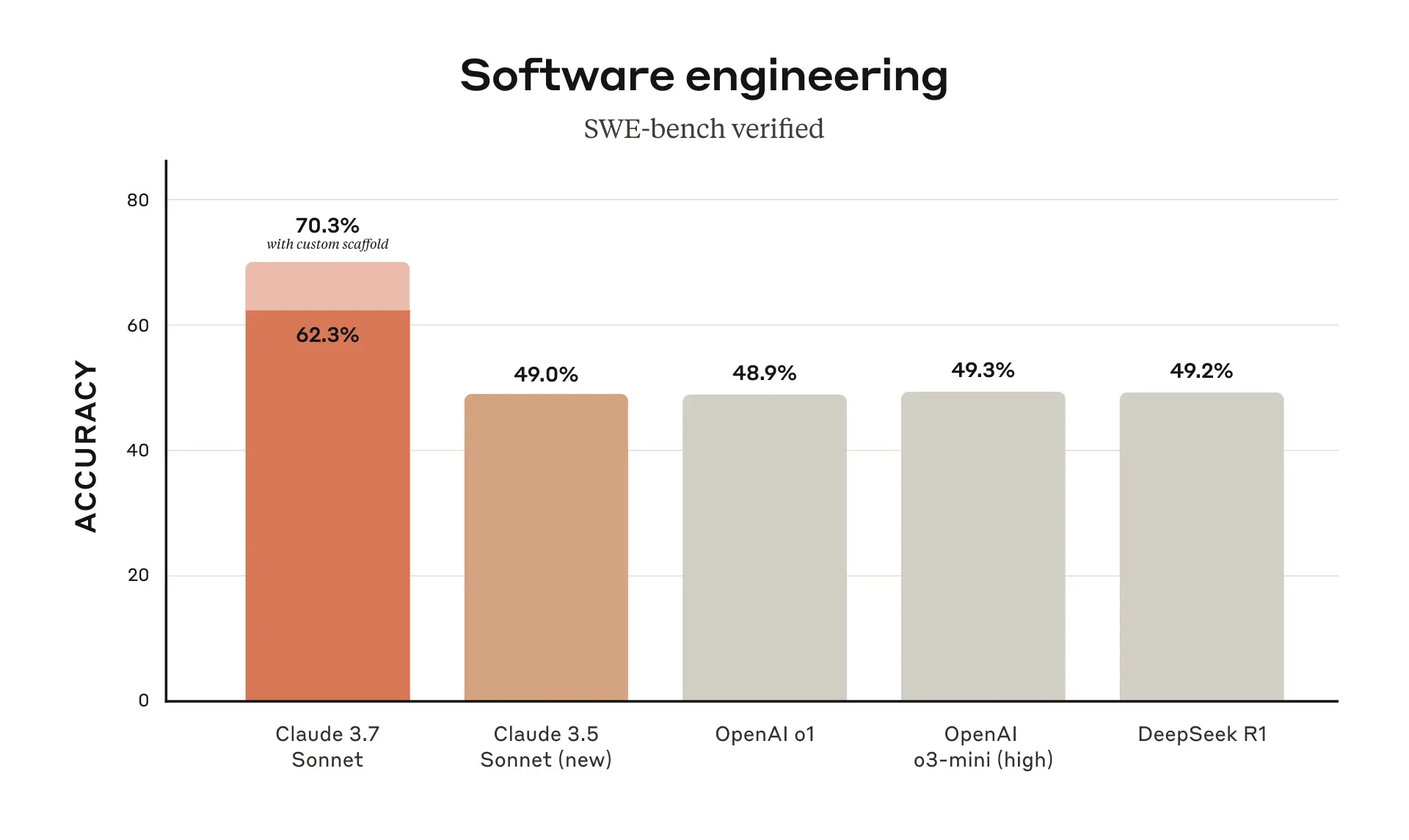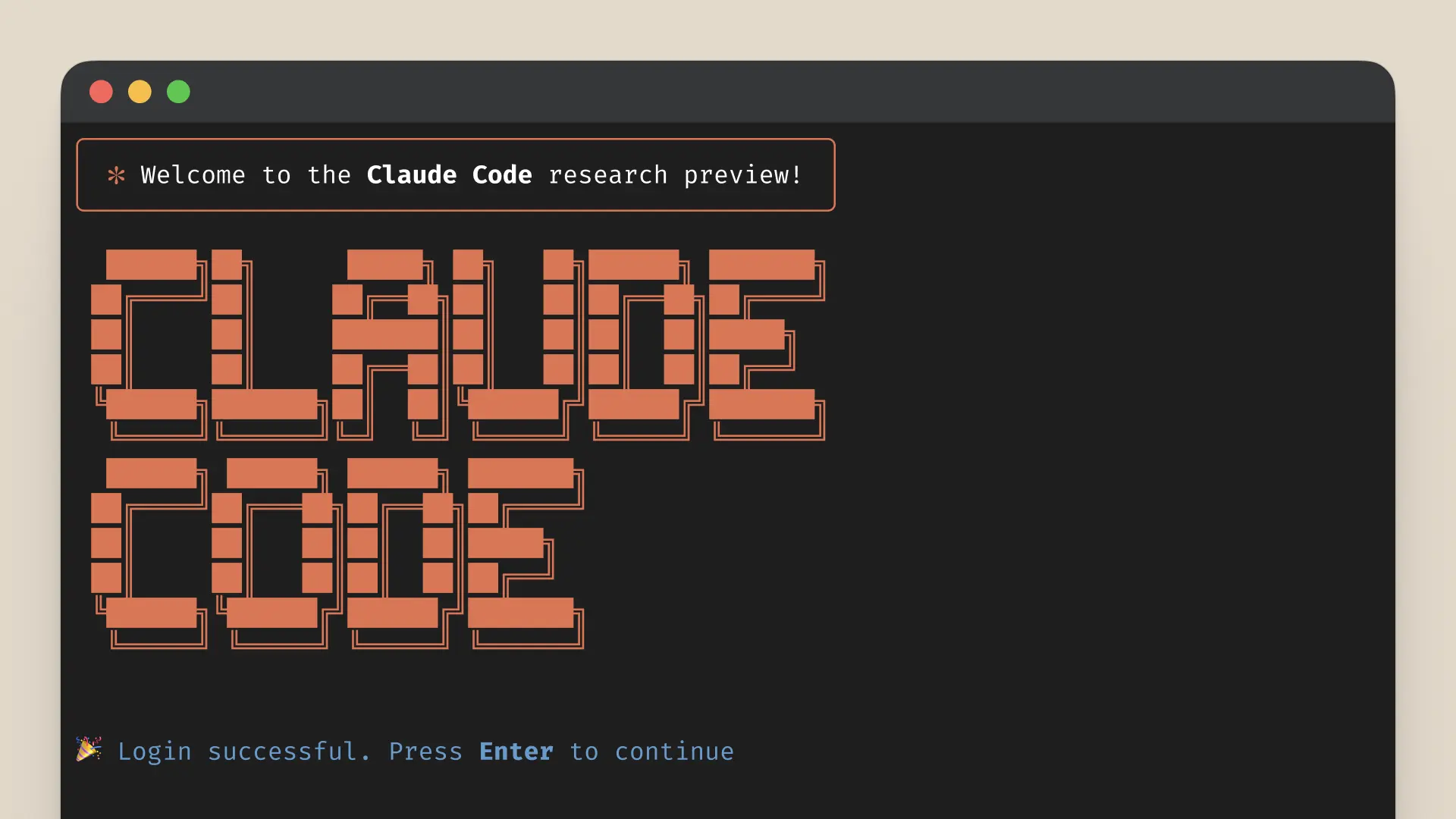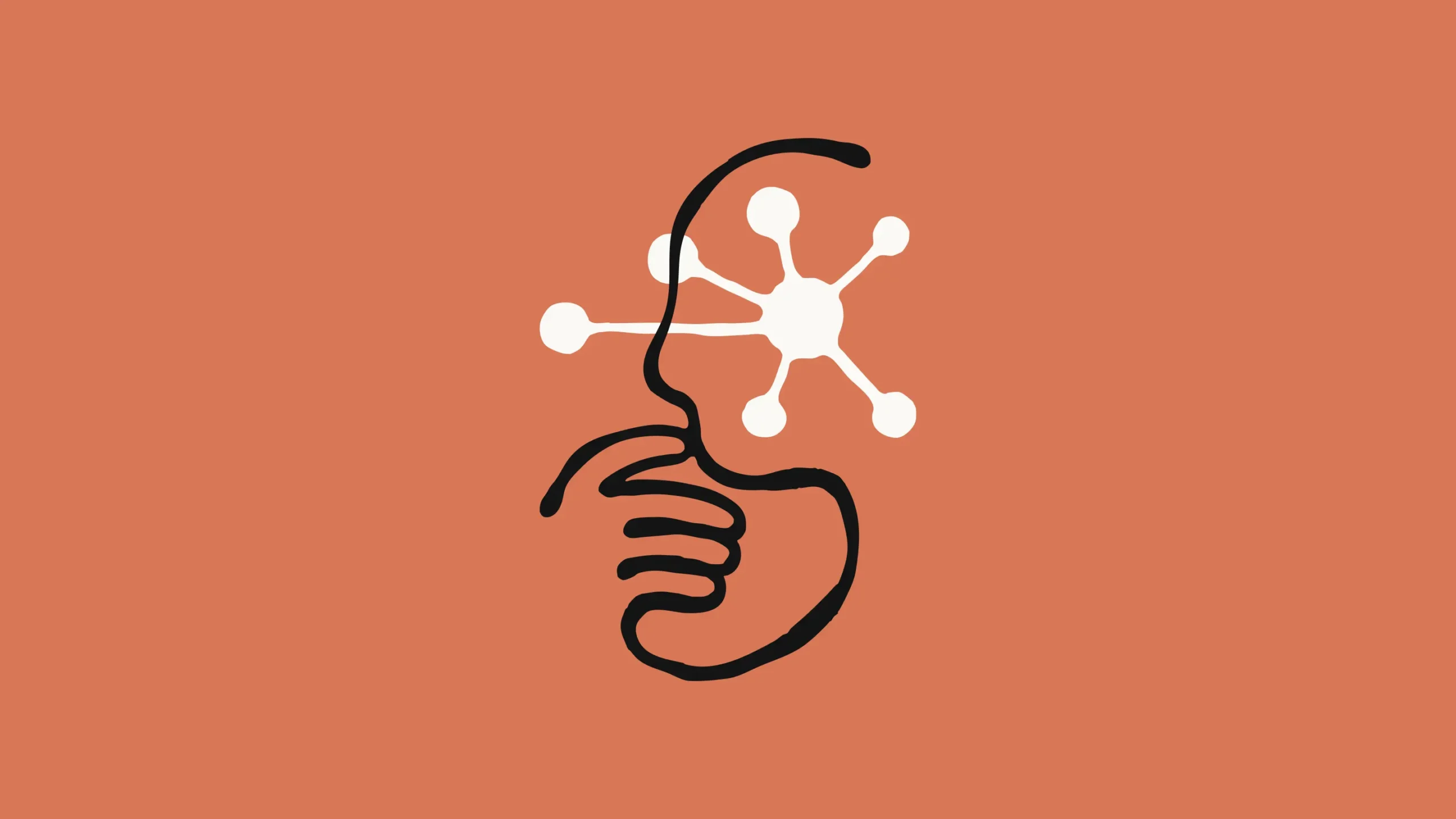Anthropic has made waves in the AI landscape with the release of Claude 3.7 Sonnet, its most sophisticated AI model yet, and the introduction of Claude Code, a groundbreaking agentic coding tool. With these new offerings, Anthropic continues its push toward creating AI systems that combine raw computational power with nuanced, human-like reasoning.
What’s New in Claude 3.7 Sonnet
- Hybrid Reasoning Capabilities
- First-of-its-kind hybrid reasoning model that allows users to choose between near-instant responses or extended, step-by-step analytical thinking.
- Extended Thinking Mode enhances performance in complex tasks like math, physics, instruction-following, and coding by enabling self-reflection before responding.
- Fine-grained control via API lets users set thinking budgets, defining how many tokens the model can use for deep analysis (up to 128K tokens).
- Enhanced Performance in Coding & Front-End Development
- Significant improvements in coding tasks, particularly in handling complex codebases, front-end web development, and full-stack updates.
- Achieved state-of-the-art results on major benchmarks:
- SWE-bench Verified: Leading in solving real-world software engineering issues.
- TAU-bench: Top performer in complex real-world tasks involving user and tool interactions.
- Introduction of Claude Code (Limited Research Preview)
- A new agentic coding tool designed for developers to interact with directly from the command line.
- Supports a full range of tasks: searching code, editing files, writing/running tests, committing to GitHub, and using command-line tools.
- Early testing shows Claude Code reduces task times drastically—tasks that took 45+ minutes manually now completed in a single pass.
- Flexible Pricing and Accessibility
- Same pricing as Claude 3.5 Sonnet: $3 per million input tokens and $15 per million output tokens, including thinking tokens.
- Available on all Claude plans—Free, Pro, Team, and Enterprise—with Extended Thinking Mode on all paid plans.
- Also accessible via Anthropic API, Amazon Bedrock, and Google Cloud’s Vertex AI.
- Improved Real-World Task Handling
- Shifted focus from competition-style problem-solving to tackling real-world business tasks.
- Outperformed competitors in practical coding challenges, demonstrating superior planning, execution, and error reduction.
- Upgraded Safety & Reliability Measures
- Enhanced ability to distinguish between harmful and benign requests, resulting in a 45% reduction in unnecessary refusals.
- Strengthened defenses against prompt injection attacks and improved system transparency on how Claude makes decisions.
- A comprehensive system card details safety evaluations and Responsible Scaling Policy adherence.
- GitHub Integration for Developers
- Claude.ai now supports GitHub integration on all plans, enabling developers to link repositories directly.
- Claude can now provide more personalized assistance for bug fixes, feature development, and documentation creation across GitHub projects.
- Developer-Centric Design with Continuous Improvement
- Ongoing updates to Claude Code based on developer feedback, with plans to enhance:
- Tool call reliability
- Support for long-running commands
- Improved in-app rendering
- Expanded understanding of Claude’s capabilities
- Ongoing updates to Claude Code based on developer feedback, with plans to enhance:
- Real-World Use Case Success Stories
- Replit used Claude to build complex web apps and dashboards from scratch.
- Canva praised its ability to produce production-ready code with superior design aesthetics and fewer errors.
- Vercel highlighted its precision in managing complex agent workflows.
- User Experience Enhancements
- In Pokémon gameplay tests, Claude 3.7 outperformed all previous models, demonstrating advanced planning and problem-solving skills.
- Supports both speed-focused queries and deep, reflective answers, making it versatile for different user needs.
Claude 3.7 Sonnet and Claude Code together mark a significant leap in AI development, blending speed, depth, and real-world applicability, while maintaining a focus on security, user control, and developer empowerment.
You can read their post on the release here: https://www.anthropic.com/news/claude-3-7-sonnet
Claude 3.7 Sonnet: Hybrid Reasoning at Its Best

At the heart of this release is Claude 3.7 Sonnet, a model designed to redefine how artificial intelligence handles complex tasks. Dubbed the most intelligent AI available today, it introduces hybrid reasoning—a feature that allows the AI to switch seamlessly between quick, concise answers and deep, step-by-step analytical thinking. This flexibility gives users the best of both worlds: rapid responses when speed is essential and in-depth explanations when accuracy and detail are paramount.
This hybrid approach isn’t just a marketing buzzword; it positions Claude 3.7 Sonnet as a game-changer in fields that require a balance of speed and depth, such as scientific research, financial analysis, and software development. The AI’s strength in complex mathematics, coding challenges, and multi-step logical reasoning makes it an invaluable tool for professionals and hobbyists alike.
Performance Meets Accessibility
Despite its advanced capabilities, Claude 3.7 Sonnet remains accessible. Anthropic has kept the same pricing as its predecessor, Claude 3.5 Sonnet, ensuring that the next generation of AI remains within reach for developers and businesses. The model is available through the Claude app, Anthropic’s API, and can also be integrated using Amazon Bedrock and Google Cloud’s Vertex AI, giving developers a range of options for implementation.
Claude Code: AI That Codes With You

Accompanying Sonnet is Claude Code, a next-generation coding assistant that takes AI-driven development to new heights. Unlike traditional code completion tools, Claude Code acts more like a collaborative partner than a passive assistant. It doesn’t just write snippets—it searches, edits, tests, and even commits code, using command-line tools and integrating seamlessly into developer workflows.
This positions Claude Code as a serious competitor to existing coding tools like GitHub Copilot and Tabnine, but with an edge—its ability to actively reason through code challenges, suggest optimizations, and even debug complex issues in real-time.
Anthropic’s Broader Vision: AI That Understands Context and Intent
Anthropic has long been an advocate for creating AI systems grounded in safety and alignment with human values. The release of Claude 3.7 Sonnet aligns with this mission by delivering an AI model that not only solves problems but also understands context, intent, and the nuances of human reasoning. Its development reflects the broader industry shift toward responsible AI—systems that are not only powerful but also transparent and aligned with ethical guidelines.
The Competitive Landscape: How Claude 3.7 Stacks Up
With this release, Anthropic is positioning itself directly alongside industry titans like OpenAI’s GPT-4 Turbo and Google DeepMind’s Gemini 1.5 Pro. While GPT-4 Turbo is known for its versatility and Gemini 1.5 for its multi-modal capabilities, Claude 3.7 Sonnet carves its niche through hybrid reasoning and precision in technical fields, particularly in mathematics and coding.
Early users have praised Claude 3.7’s ability to outperform existing models in complex problem-solving, often producing cleaner, more accurate code and offering better logical consistency in long-form content generation.
The Future of AI with Anthropic
Anthropic’s latest advancements point to a future where AI tools are not just reactive but proactive collaborators—capable of both solving technical challenges and participating meaningfully in creative and strategic processes. With Claude 3.7 Sonnet and Claude Code, the company isn’t just releasing new models; it’s signaling a broader shift toward intelligent, context-aware AI systems that can elevate productivity across industries.
As the AI race intensifies, Anthropic’s focus on hybrid reasoning, developer collaboration, and ethical AI could very well position it as a front-runner in shaping the next generation of artificial intelligence.
Key Takeaways
- Claude 3.7 Sonnet delivers both instant responses and in-depth reasoning capabilities
- The new AI models represent Anthropic’s most advanced technology achievement
- Claude Code introduces specialized features for programming and development tasks
Overview of Anthropic’s Claude 3.7 Sonnet and Claude Code
Anthropic’s latest AI releases combine advanced reasoning capabilities with specialized coding functions. The new models feature instant response times, step-by-step problem solving, and enhanced coding tools for software development tasks.
Artificial Intelligence and Reasoning Models
Claude 3.7 Sonnet represents a significant advancement in AI reasoning capabilities. The model switches between quick responses and detailed step-by-step thinking based on task complexity.
The hybrid reasoning approach enables Claude 3.7 Sonnet to break down complex problems into manageable components. This process creates more accurate and transparent solutions.
Users can view the model’s chain of thought, making it easier to understand how it reaches specific conclusions. This feature sets it apart from previous AI models that often operated as black boxes.
Integration with Coding Workflows
Claude Code functions as an agentic coding tool, directly assisting developers with common programming tasks. The model can write and modify source code, create test suites, and manage version control.
Key coding capabilities:
- Writing and debugging code
- Creating and running test cases
- Managing GitHub operations
- Editing existing files
- Supporting multiple programming languages
The model maintains context across coding sessions, enabling more coherent and consistent development assistance.
Performance Benchmarks and Model Comparisons
Claude 3.7 Sonnet demonstrates superior performance on standard AI benchmarks. The model shows particular strength in reasoning and coding tasks.
Performance metrics:
- SWE-Bench: Improved code generation accuracy
- TAU-Bench: Enhanced problem-solving capabilities
- Reasoning Tests: Higher scores compared to GPT-4
The model excels at maintaining accuracy while delivering faster response times than previous versions. Testing shows consistent performance across various programming languages and development environments.
Real-world applications showcase the model’s practical benefits in software development projects. Teams report reduced development time and improved code quality when using Claude Code’s features.
Technological Integration and Partnerships
Anthropic has established strategic partnerships with major tech companies and integrated Claude 3.7 Sonnet across multiple platforms to enhance accessibility and functionality.
Collaboration with Online Platforms and Tools
Amazon and Google have backed Anthropic’s development of Claude 3.7 Sonnet, providing crucial infrastructure support and cloud computing resources. The model integrates with GitHub through specialized APIs, enabling developers to streamline their coding workflows.
The API architecture supports various command-line tools and development environments. Developers can access Claude through multiple endpoints, with authentication methods designed for enterprise-grade security.
Key Platform Integrations:
- Amazon Web Services for cloud infrastructure
- Google Cloud Platform for distributed computing
- GitHub Copilot integration for code assistance
- Custom APIs for enterprise solutions
User Experience and Engagement
Claude 3.7 Sonnet delivers responses within milliseconds while maintaining high accuracy. The model acts as an active collaborator, breaking down complex problems into manageable steps.
Users can select from different interaction modes based on their needs:
- Code completion and debugging
- Step-by-step problem solving
- Natural language explanations
- Technical documentation generation
The platform’s interface adapts to user expertise levels, from beginners to advanced developers. Real-time feedback mechanisms help refine outputs based on user interactions.
The model excels at agentic coding tasks, working independently to suggest solutions while maintaining user control over the development process.
Frequently Asked Questions
Claude 3.7 Sonnet represents major advances in AI capabilities, particularly in extended reasoning and specialized task performance across coding, finance, and legal domains.
What are the capabilities of the Claude 3.7 Sonnet compared to previous versions?
Claude 3.7 Sonnet features enhanced reasoning abilities and can sustain longer thought processes based on user requirements.
The model demonstrates improved performance in specialized domains like finance and legal analysis.
How does the Claude 3.7 Sonnet enhance coding and programming tasks?
The model shows notable improvements in “agentic coding” capabilities, allowing for more sophisticated code generation and analysis.
Users can expect better code understanding and more accurate programming assistance compared to earlier versions.
What is the pricing structure for Claude 3.7 Sonnet?
Pricing details for Claude 3.7 Sonnet have not been publicly disclosed by Anthropic.
The model is expected to follow similar pricing structures to previous Claude versions.
Can you describe the differences between the Opus, Sonnet, and Haiku models in the Claude 3 family?
Opus serves as the most advanced model in the Claude 3 family, achieving top performance on AI benchmarks.
Sonnet offers a balance of capabilities and efficiency for most use cases.
Haiku will be released soon as a lighter version of the model family.
How does Anthropic’s Claude 3.7 Sonnet integrate with existing AI infrastructures?
The model is accessible through claude.ai and the Claude API, which operates in 159 countries.
Integration options include direct API access for developers and web interface usage for general users.
What advancements in AI has Anthropic introduced with the launch of Claude 3.7 Sonnet?
The model introduces hybrid reasoning capabilities, combining multiple approaches to problem-solving.
Claude 3.7 Sonnet marks a significant step forward in extended thinking capabilities for AI systems.
The new version maintains high performance while handling complex, multi-step tasks.







